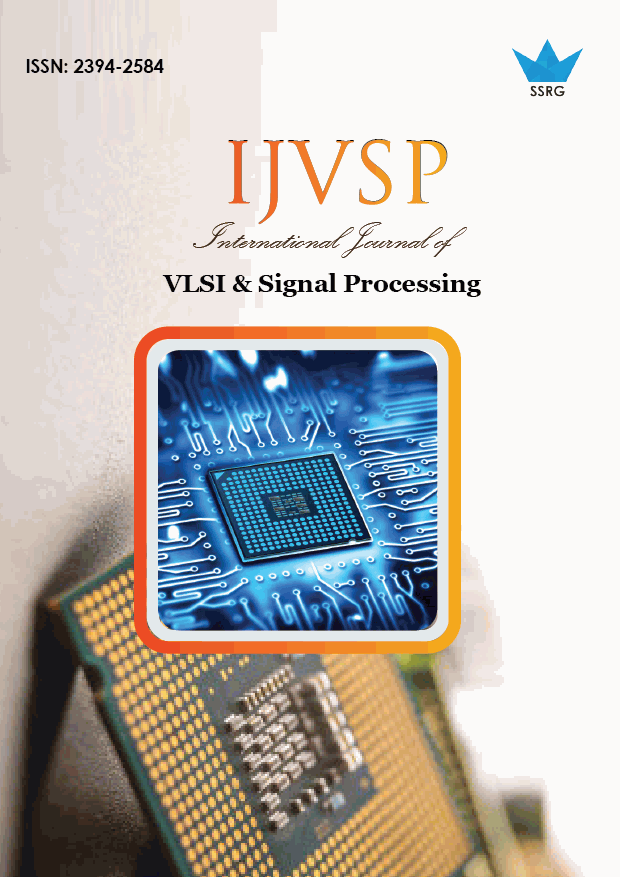Design of Robust and power Efficient 8-Bit Ripple Carry Adder using Different Logic Styles

| International Journal of VLSI & Signal Processing |
| © 2016 by SSRG - IJVSP Journal |
| Volume 3 Issue 2 |
| Year of Publication : 2016 |
| Authors : Mangayarkkarasi M and Joseph Gladwin S |
How to Cite?
Mangayarkkarasi M and Joseph Gladwin S, "Design of Robust and power Efficient 8-Bit Ripple Carry Adder using Different Logic Styles," SSRG International Journal of VLSI & Signal Processing, vol. 3, no. 2, pp. 1-7, 2016. Crossref, https://doi.org/10.14445/23942584/IJVSP-V3I3P101
Abstract:
The binary adders are key component in digital signal processors (DSP). These adders are crucial building blocks in very large scale integrated circuits. Its efficient implementation is highly important because a carry propagation involving all operand bits has to be performed. With the increasing level of device integration power became the predominant design goal for fast adders. Low power consumption and smaller area are some of the most important criteria for fabrication of DSP systems and high performance systems. In this paper we try to determine the best solution to this problem by comparing a few 8-bit Ripple Carry Adder (RCA) circuits implementation with Complementary, Dynamic, Constant Delay (CD) and Energy Efficient Constanta Delay (EE-CD) logic styles. The adders are simulated using MicroWind environment to find an efficient adder structure. To reduce the power consumption for low power applications an EECD logic style is proposed. When we compare the power consumption of all the adder logic style we find that Complementary logic style consume more power. The EE-CD logic style has better power consumption compared to all other logic styles.
Keywords:
CMOS, Ripple Carry Adder, Power Consumption, Complementary Logic, Dynamic Logic, Constant Delay Logic, Energy Efficient- Constant Delay Logic.
References:
[1] J. M. Rabey, Digital Integrated Circuits, A Design Perspective. Prentice-Hall, 1996.
[2] Deepika Gupta, Nitin Tiwari , Sarin. R.K, “Analysis Of Modified Feedthrough Logic With Improved Power Delay Product”, International Journal Of Computer Applications ISSN : 0975- 8887, vol.69, no.5 pp.214-219, 2013.
[3] S. M. Kang, Y. Leblebici, ‘CMOS Digital Integrated Circuits: Analysis & Design’, TATA McGraw- Hill Publication, 3e, 2003.
[4] V. Navarro-Botello, J. A. Montiel-Nelson, and S. Nooshabadi, “Performance Analysis of high performance fast feedthrough logic families in CMOS,” IEEE Trans. Cir. & syst. II, vol. 54, no. 6, Jun. 2007, pp. 489-493.
[5] B. Vijayarani, “Design of synchronous full adder”, International Conference on Computing and Control Engineering, April 2012.
[6] H. Bui, Y. Wang, Y. Jiang, “Design and analysis of low-power 10-transistor full adders using novel xor–xnor gates”, IEEE transactions on circuits and systems analog and digital signal processing, vol. 49, pp. 25-30, 2002.
[7] Rajaneesh Sharma and ShekharVerma, “Comparitive Analysis of Static and Dynamic CMOS Logic Design”, IEEE International Conference on Computing & Communication Technologies (ICACCT) , pp.231-234, 2011.
[8] Chuang.P, Li.D, and Sachdev.M, “Design of a 64-bit low-energy high performance adder using dynamic feed through logic,” in Proc. IEEE Int. Circuits Syst. Symp, pp. 3038–3041, May 2009.
[9] Pierce Chuang, David Li, ManojSachdev,“Constant Delay Logic Style”, IEEE Transactions on Very Large Scale Integration(VLSI) Systems, vol.21, no.3, pp. 554-565, 2013
[10] K. Lavanya, V. SurendraBabu, “Design of 8-bit Ripple Carry Adder Using Constant Delay Logic”, International Journal of Electrical, Electronics and Computer Systems (IJEECS), vol.2, no.8,9, pp. 32-37, 2014.
[11] M. Aguirre-Hernandez and M. Linares-Aranda, “CMOS CMOS Full-adders for energy-efficient arithmetic applications,” IEEE Trans. Very Large Scale Integr. (VLSI) Syst., vol. 19, no. 99, pp. 1–5, Apr. 2010.
[12] Arunraj R, Vishnu Narayanan P M, “Design of Robust and Power Efficient Full Adder Using Energy Efficient Feedthrough Logic”, International Journal of Engineering Research and General Science,vol.2, no.2, pp. 96-101, Feb-Mar 2014.
[13] N. Akilandeswari, R. Vijayabhasker, “Design of an Energy-Efficient Constant Delay Logic for Low Power Applications”, International Journal of Research and Innovation in Engineering Technology, vol.1, no.1, pp. 25-32,June 2014.

 10.14445/23942584/IJVSP-V3I3P101
10.14445/23942584/IJVSP-V3I3P101